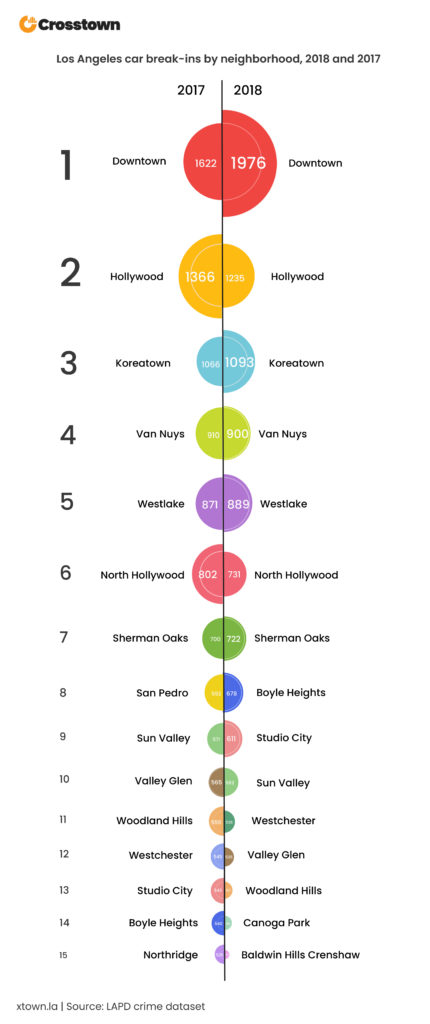Here’s where NOT to park your car
Crime fell slightly across Los Angeles last year, but car break-ins remained at a stubbornly high level.
There were 33,099 thefts from vehicles in 2018, up slightly from 32,980 a year earlier.
According to Los Angeles Police Department data, car break-ins constitute close to 15% of all crime in the city, making it one of the most common offenses. Police say parked cars are an easy target for people desperate for quick cash, especially when owners leave doors unlocked.
Though the overall number of reported incidents barely budged, some neighborhoods saw a sharp increase.
The ranking of the top seven neighborhoods for car break-ins remained the same for the past two years.
Downtown, the neighborhood with the highest total number of car break-ins, saw an increase of 22% from 2017. But Hollywood, which retained its No. 2 spot, saw a 10% decrease from the previous year.

Boyle Heights jumped to 8th place from 14th place a year ago, as car break-ins increased by 25.5%. Studio City moved into 9th place from 13th place in 2017, with reports rising by 12.5%.
Some changes were positive. San Pedro, for instance, fell to the 22nd spot last year from 8th place in 2017.
Tim Gonzales, a Koreatown resident who works at USC, has had his car broken into three times recently, with the same window broken all three times.
The first time it happened, he said, “it wasn’t just my car that was broken into. The four cars parked in front of me also had their car windows smashed.”
Thieves made off with some Christmas gifts and a bag filled with sheet music.
“I don’t feel safe parking in my own neighborhood at all,” he said.
How we did it: We looked at LAPD publicly available data on reports of crimes of petty and grand theft from motor vehicles, petty and grand burglaries from motor vehicles, as well as attempted thefts and burglaries from vehicles. For neighborhood boundaries, we rely on the borders defined by the Los Angeles Times. Learn more about our data here.
LAPD data only reflects crimes that are reported to the department, not how many crimes actually occurred. In making our calculations, we rely on the data that the LAPD makes publicly available. On occasion, LAPD may update past crime reports with new information, or recategorize past reports. Those revised reports do not always automatically become part of the public database.
Want to know how your neighborhood fares? Or simply just interested in our data? Email us at askus@xtown.la






